高考英语情态动词真题汇编(含答案)
【英语】高考英语情态动词真题汇编(含答案)及解析
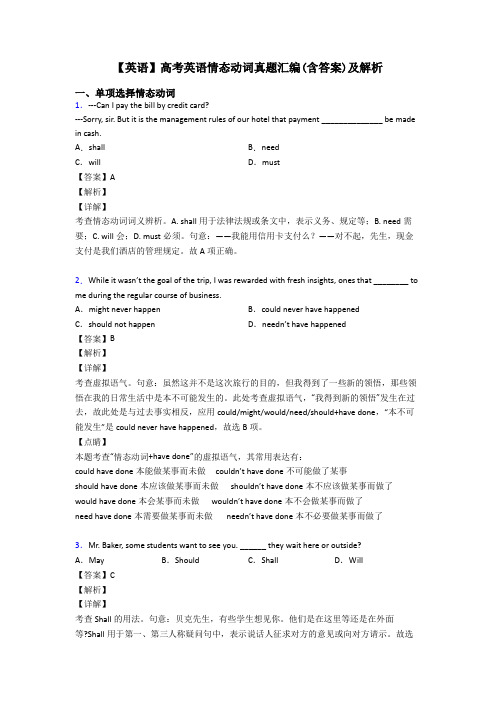
(2)We shall have a good time in the park.我们在公园里会玩得很高兴的。常考的特殊用法
1. Shall用于第一人称,表示征求对方的意愿。如:What shall we do this evening?
8.—You rang me up at about 10:00 last night, didn't you?
—No, I didn't phone you. Itsomeone else.
A.must have beenB.could beC.must beD.could have been
【答案】A
【答案】C
【解析】
【详解】
考查Shall的用法。句意:贝克先生,有些学生想见你。他们是在这里等还是在外面等?Shall用于第一、第三人称疑问句中,表示说话人征求对方的意见或向对方请示。故选C。
【点睛】
Shall的用法
Shall作为助动词,一般用于第一人称Ⅰ和We,表示一个将来的动作,构成将来时态。Shall后面接动词原形。例如:
11.—Sorry, Mum! I failed the job interview again.
—Oh, it's too bad. You________ have made full preparations.
A.mustB.canC.wouldD.should
【答案】D
【解析】
【详解】
考查情态动词+have done结构。句意:—对不起,妈妈,我面试又失败了。—噢,那太糟糕了,你应该做好充分准备的。A.must必须;B.can可以;C.would将会;D.should应该。这里是情态+have done的结构的虚拟语气,can+have+done”表示对过去行为的怀疑,用于疑问句,译成“可能做过……吗?”;could+have+done,表示对过去事情的假设,意思是本来能够做某事而没有做;must+have+done”表示对过去事情的肯定推测,译成“一定做过某事”,该结构只用于肯定句;should+have+done意思是“本来应该做某事,而实际没做”。故选D
高考情态动词单选20题答案解析版

高考情态动词单选20题答案解析版1. She ______ know the answer. She always gets good grades in English.A.mustB.canC.mayD.could答案:A。
选项A“must”表示肯定的推测,意为“一定”,根据后句她英语总是得高分,可以推断她一定知道答案。
选项B“can”表示能力,“能、会”;选项C“may”表示可能性较小的推测,“可能”;选项D“could”表示过去的能力或委婉的请求等。
2. You ______ finish your homework before you watch TV.A.mustB.canC.mayD.could答案:A。
“must”在这里表示“必须”,在看电视之前必须完成作业。
选项B“can”表示能力或允许;选项C“may”表示可能或允许;选项D“could”表示过去的能力或委婉的请求等。
3. He ______ be at home. I just saw him go out.A.mustn'tB.can'tC.may notD.couldn't答案:B。
“can't”表示否定的推测,“不可能”,因为刚刚看到他出去了,所以他不可能在家。
选项A“mustn't”表示禁止;选项C“may not”表示可能性较小的否定推测;选项D“couldn't”表示过去的否定推测,语气比“can't”弱。
4. —______ I use your pen?—Sure. Here you are.A.MustB.CanC.MayD.Could答案:B。
这里表示请求,“我能使用你的钢笔吗?”“can”可以用于请求允许。
选项A“must”表示必须;选项C“may”也可以用于请求允许,但语气比“can”弱;选项D“could”用于委婉的请求。
5. She ______ have forgotten to bring her book. She is always very careful.A.mustn'tB.can'tC.may notD.couldn't答案:B。
高中英语情态动词形式单选题60题(含答案)
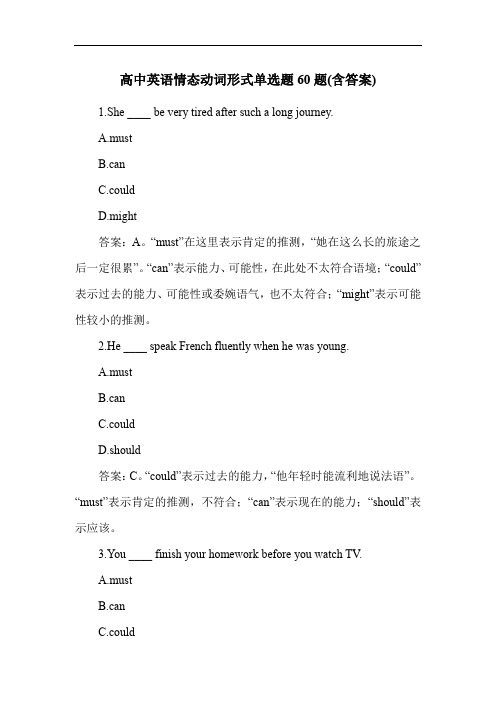
高中英语情态动词形式单选题60题(含答案)1.She ____ be very tired after such a long journey.A.mustB.canC.couldD.might答案:A。
“must”在这里表示肯定的推测,“她在这么长的旅途之后一定很累”。
“can”表示能力、可能性,在此处不太符合语境;“could”表示过去的能力、可能性或委婉语气,也不太符合;“might”表示可能性较小的推测。
2.He ____ speak French fluently when he was young.A.mustB.canC.couldD.should答案:C。
“could”表示过去的能力,“他年轻时能流利地说法语”。
“must”表示肯定的推测,不符合;“can”表示现在的能力;“should”表示应该。
3.You ____ finish your homework before you watch TV.A.mustB.canC.could答案:A。
“must”表示必须,“你必须在看电视之前完成作业”。
“can”表示能力、可能性;“could”表示过去的能力、可能性或委婉语气;“may”表示可能。
4.____ I borrow your pen?A.MustB.CanC.CouldD.Will答案:B。
“Can I...?”表示请求,“我能借你的笔吗?”“Must”表示必须,语气太强;“Could”用于更委婉的请求,但不如“Can”常用;“Will”表示将来。
5.She ____ have forgotten her keys. She's always so careful.A.can'tB.mustn'tC.shouldn'tD.needn't答案:A。
“can't”表示否定的推测,“她不可能忘了钥匙,她总是很细心”。
“mustn't”表示禁止;“shouldn't”表示不应该;“needn't”表示不必。
高考情态动词练习题及答案详解

高考情态动词练习题及答案详解一、单项选择情态动词1.Look! There are so many mistakes in your composition. You ________ have fixed full attention on it.A.can B.shouldC.need D.might【答案】B【解析】【详解】考查情态动词。
句意:看!你的作文里有那么多的错误。
你本应该把所有的注意力都集中在它上面的。
表示“本应该做但实际上没有做”应该用should have done结构,can have done 表示可能;need表示需要;might have done表示可能做过某事;故选B。
2.—I don’t really like Janes. Why did you invite him?—Don’t worry. He come. He said he was’t certain what his plans were.A.must not B.need not C.would not D.might not【答案】D【解析】考察情态动词,题干中的h e wasn’t certain说明他可能不来,可能来,因此使用不完全否定,might not。
3.-- Did Jim come?-- I don’t know. He _______ while I was out.A.might have come B.might comeC.must have come D.should have come【答案】A【解析】【详解】考查情态动词推测用法。
句意:Jim来了吗?--我不知道,在我不在的时候,可能来过。
根据前文I don’t know.可知,说话者不知道Jim来没来,因此后文推测来过,但是语气很不确定,故可知选A。
对过去情况的推测为情态动词+have done,must have done 一定做了某事,should have done 应该来过,不符合,故选A。
2022年高考英语语法复习:情态动词的一般用法 专项练习题汇编(Word版,含答案)
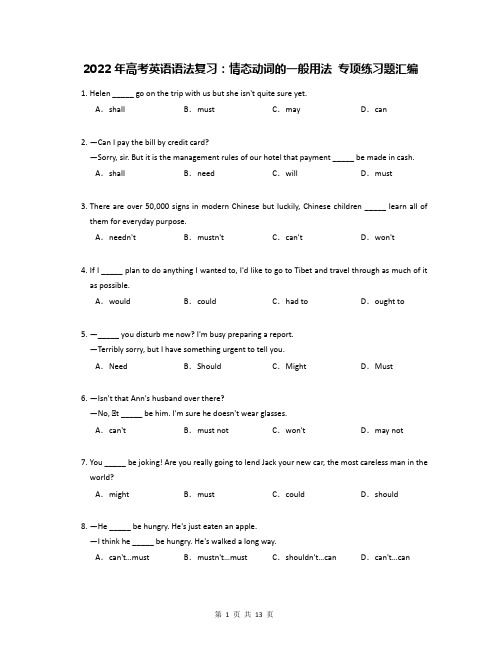
2022年高考英语语法复习:情态动词的一般用法专项练习题汇编1.Helen _____ go on the trip with us but she isn't quite sure yet.A.shall B.must C.may D.can2.—Can I pay the bill by credit card?—Sorry, sir. But it is the management rules of our hotel that payment _____ be made in cash.A.shall B.need C.will D.must3.There are over 50,000 signs in modern Chinese but luckily, Chinese children _____ learn all of them for everyday purpose.A.needn't B.mustn't C.can't D.won't4.If I _____ plan to do anything I wanted to, I'd like to go to Tibet and travel through as much of it as possible.A.would B.could C.had to D.ought to5.—_____ you disturb me now? I'm busy preparing a report.—Terribly sorry, but I have something urgent to tell you.A.Need B.Should C.Might D.Must6.—Isn't that Ann's husband over there?—No, ⅰt _____ be him. I'm sure he doesn't wear glasses.A.can't B.must not C.won't D.may not7.You _____ be joking! Are you really going to lend Jack your new car, the most careless man in the world?A.might B.must C.could D.should8.—He _____ be hungry. He's just eaten an apple.—I think he _____ be hungry. He's walked a long way.A.can't…must B.mustn't…must C.shouldn't…can D.can't…can9.—Must we clean the house now?—No, you _____.A.needn't B.may not C.mustn't D.can't10.—May I take this dictionary out of the library?—No, you _____.A.needn't B.mustn't C.can't D.shouldn't11.—I think I'll give Tom a ring.—You _____. You haven't been in touch with him for ages.A.will B.should C.have to D.may12.—Need I be there tonight?—Yes, you _____.A.must B.need C.can D.could13.Only in this way _____ progress in your English.A.you make B.can you makeC.you be able to make D.you will be able to make14.My computer _____ start this morning. There must have been something wrong with it.A.shouldn't B.wouldn't C.needn't D.mustn't15.—Will you read me a story, Mummy?—OK. You _____ have one if you go to bed as soon as possible.A.might B.must C.could D.shall16.A squirrel doesn't hibernate in winter, but it _____ worry about its food.A.needs not B.needn't to C.needn't D.doesn't need17.No student _____ go out of school to have lunch without permission of the headteacher.A.might B.must C.shall D.could18."You _____ watch DVD all the evening if you wish," he said to her.A.should B.have to C.ought to D.may19.If you're going to the club tonight, you _____ Richard there.A.might meet B.might have metC.may have met D.may have been met20.—I feel cold. ____ I close the window?—Sure. Go ahead!A.Shall B.Need C.Would D.Should21.Life is unsure; even the poorest _____ become the richest.A.shall B.must C.need D.might22.—What's the matter with the door? I can't open it.—_____ I try to open it for you?A.Will B.Shall C.Won't D.Need23.—Difficulties always go with me!—Cheer up! If God closes the door in front of you, there _____ be a window opened for you.A.must B.would C.could D.can24.If Lincoln had lived, it _____ be that his postwar policies would have brought criticism upon himthat would _____ his reputation.A.might as well … have tarnished B.might well … have tarnishedC.might as well … tarnish D.might well … tarnish25.—Shall we put off the experiment till next week?—_____. I don't think our teacher will be happy with it.A.Never mind B.Sure, go aheadC.Yes, better not D.I'd rather not26.—Who's singing in the next room? Is it Lucy?—It _____ be her. She has gone to New York.A.can't B.shouldn't C.mustn't D.won't27.No driving after drinking is a rule that every driver _____ obey in our country.A.will B.shall C.may D.can28.Samuel, the tallest boy in our class, _____ easily reach the books on the top shelf.A.must B.should C.can D.need29.Mrs. Brown really _____ go on a diet. She has put on so much weight since she gave up jogging.A.could B.ought to C.may D.must30.Days later, my brother called to say he was all right, but ______ say where he was.A.mustn't B.shouldn't C.wouldn't D.mightn't31.It has been announced that all the candidates _____ remain in their seats until all the papershave been collected.A.shall B.could C.would D.ought32.—What do you think of the conditions here?—Oh, wonderful! _____ a better hotel.A.Seldom we can find B.Rarely did we findC.Never we find D.Hardly can we find33.You say you will not do it, but I say you _____ do it.A.shall B.may C.can D.need34.There _____ be any difficulty about passing the road test since you have practised a lot in thedriving school.A.mustn't B.shan't C.shouldn't D.needn't35.The room is so clean. He _____ have cleaned it yesterday evening.A.will B.need C.can D.must36.I _____ use a clock to wake me up because at 6 o'clock each morning the train comes by myhouse.A.couldn't B.mustn't C.shouldn't D.needn't37.—What should I wear to the party?—Well, it isn't very formal. You _____ wear whatever you like.A.can B.must C.should D.need38.You _____ return the book now. And you can keep it till next week.A.needn't B.can't C.mustn't D.won't39.—Who _____ it be that left the door unlocked?—It might be Mike. He is always forgetting things.A.would B.should C.must D.could40.Only in this way _____ progress in your photography.A.you make B.can you makeC.you are able to make D.you will be able to make41.—What's your name?—Khulaifi. _____ I spell that for you?A.Shall B.Would C.Can D.Might42.Never _____ forget that poem and the inspiration _____ provided for my first novel.A.can I; which B.will I; that C.shall I; it D.must I; what43.—Will you go travelling with me this summer?—I'm not sure. I _____ have to take care of my grandma.A.may B.shall C.need D.must44.Some young people these days just _____ go out of their homes to contact the real world.A.mustn't B.won't C.mightn't D.shouldn't45.As the rule says, every student _____ remain seated until their papers are collected.A.can B.may C.shall D.will46.Life is not predictable; even the worst _____ become the best.A.shall B.might C.must D.need47.—Is that Bob there?—No, it _____ be him. He has gone to Hainan with his family.A.mustn't B.can't C.mightn't D.may not48.Our English teacher is considerate, helpful, and warm-hearted, but sometimes she _____ beangry at our silly mistakes.A.should B.must C.can D.shall49.—I am sure I saw Brian in the park this morning.—You _____ be imagining things. He left for America last night.A.need B.can C.must D.shall50.Only when you have got enough data _____ come to a final conclusion.A.can you B.you can C.would you D.you would答案1. 【答案】C【知识点】may2. 【答案】A【知识点】shall3. 【答案】A【知识点】need4. 【答案】B【知识点】could5. 【答案】D【知识点】must6. 【答案】A【知识点】can7. 【答案】B【解析】此题考查情态动词。
【英语】高三英语情态动词各地方试卷集合汇编含解析
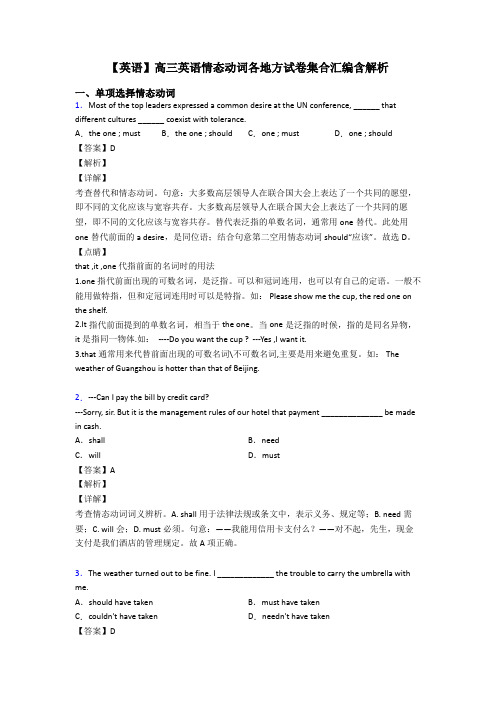
【英语】高三英语情态动词各地方试卷集合汇编含解析一、单项选择情态动词1.Most of the top leaders expressed a common desire at the UN conference, ______ that different cultures ______ coexist with tolerance.A.the one ; must B.the one ; should C.one ; must D.one ; should【答案】D【解析】【详解】考查替代和情态动词。
句意:大多数高层领导人在联合国大会上表达了一个共同的愿望,即不同的文化应该与宽容共存。
大多数高层领导人在联合国大会上表达了一个共同的愿望,即不同的文化应该与宽容共存。
替代表泛指的单数名词,通常用one替代。
此处用one替代前面的a desire,是同位语;结合句意第二空用情态动词should“应该”。
故选D。
【点睛】that ,it ,one 代指前面的名词时的用法1.one 指代前面出现的可数名词,是泛指。
可以和冠词连用,也可以有自己的定语。
一般不能用做特指,但和定冠词连用时可以是特指。
如: Please show me the cup, the red one on the shelf.2.It 指代前面提到的单数名词,相当于the one。
当one是泛指的时候,指的是同名异物,it是指同一物体.如: ----Do you want the cup ? ---Yes ,I want it.3.that通常用来代替前面出现的可数名词\不可数名词,主要是用来避免重复。
如: The weather of Guangzhou is hotter than that of Beijing.2.---Can I pay the bill by credit card?---Sorry, sir. But it is the management rules of our hotel that payment ______________ be made in cash.A.shall B.needC.will D.must【答案】A【解析】【详解】考查情态动词词义辨析。
(英语)高考英语情态动词题20套(带答案)

一、单项选择情态பைடு நூலகம்词
1.AI will surely be a feature of future life, but it _____ be used responsibly and in a proper way.
A.canB.needC.mustD.will
考点:考查情态动词用法
点评:考本题是高考必考考点,一定要牢记句型意思。must have done过去肯定做了某事。should have done本应该做而实际未做。can’t have done过去不可能做了某事;shouldn’t have done本不应该做而实际做了。need have done本有必要做某事;needn’t have done本没有必要做某事;注意没有mustn’t have done的形式。
中国学生的常见病句是:They...; they certainly have arrived.病句的句义是“他们当然已经到达了。”(这不是对过去的肯定推测,而是断定动作已经完成。)
11.According to a newly released regulation on online video services, no one _____ generate, release or spread fake news or information by using such technologies.
Somebody must have stolen the ring.肯定有人偷了这枚戒指. [该句所推断的偷窃动作发生在过去.]
The temperature must have dropped to below zero last night, because the water is frozen all over.昨夜的温度肯定降到零度以下,因为水都冻住了。
高考英语情态动词真题汇编(含答案)及解析
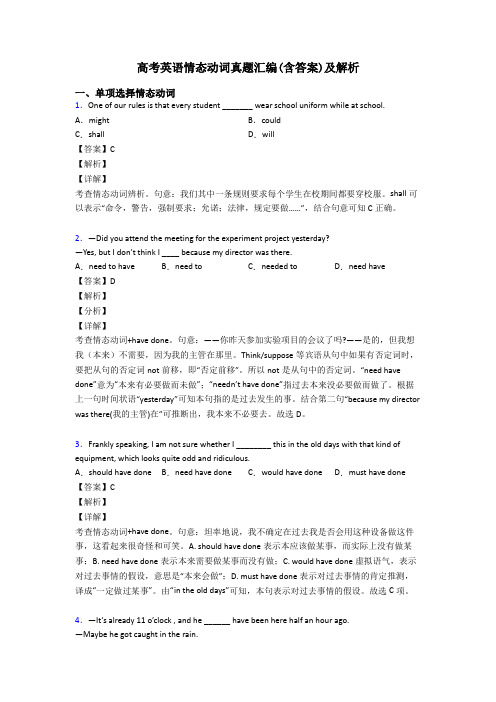
高考英语情态动词真题汇编(含答案)及解析一、单项选择情态动词1.One of our rules is that every student _______ wear school uniform while at school. A.might B.couldC.shall D.will【答案】C【解析】【详解】考查情态动词辨析。
句意:我们其中一条规则要求每个学生在校期间都要穿校服。
shall可以表示“命令,警告,强制要求;允诺;法律,规定要做……”,结合句意可知C正确。
2.—Did you attend the meeting for the experiment project yesterday?—Yes, but I don’t think I ____ because my director was there.A.need to have B.need to C.needed to D.need have【答案】D【解析】【分析】【详解】考查情态动词+have done。
句意:——你昨天参加实验项目的会议了吗?——是的,但我想我(本来)不需要,因为我的主管在那里。
Think/suppose等宾语从句中如果有否定词时,要把从句的否定词not前移,即“否定前移”。
所以not是从句中的否定词。
“need have done”意为“本来有必要做而未做”;“needn’t have done”指过去本来没必要做而做了。
根据上一句时间状语“yesterday”可知本句指的是过去发生的事。
结合第二句“because my director was there(我的主管)在”可推断出,我本来不必要去。
故选D。
3.Frankly speaking, I am not sure whether I ________ this in the old days with that kind of equipment, which looks quite odd and ridiculous.A.should have done B.need have done C.would have done D.must have done 【答案】C【解析】【详解】考查情态动词+have done。
- 1、下载文档前请自行甄别文档内容的完整性,平台不提供额外的编辑、内容补充、找答案等附加服务。
- 2、"仅部分预览"的文档,不可在线预览部分如存在完整性等问题,可反馈申请退款(可完整预览的文档不适用该条件!)。
- 3、如文档侵犯您的权益,请联系客服反馈,我们会尽快为您处理(人工客服工作时间:9:00-18:30)。
高考英语情态动词真题汇编(含答案)一、单项选择情态动词1.would可以表达过去常常做的事,过去习惯发生的动作:Pirates would bury gold in a cave. 海盗们常常把黄金藏在山洞中。
We would take a walk along the river. 我们过去常常沿河散步。
3. would后接like、love、mind等动词,表示要求、邀请、希望或询问,此时不是说过去,而是对现在的询问:Would you like to come to my party? 你愿意来我的派对吗?Would you mind coming with us? 你介意和我们一起吗?比如本题,would 表示婉转的请求,征求对方的意见,故选A。
2.Traveling by subway ______ sometimes be quite an adventure, especially during the rush hour.A.must B.can C.shall D.should【答案】B【解析】【详解】考查情态动词。
句意:乘地铁旅行有时可能相当冒险,尤其是在交通高峰期。
A. must必须;一定;B. can能够;可能;C. shall将会;D. should应该;应当。
本句中can表示客观可能性(客观原因形成的能力),故选B。
3.It ________ be the postman at the door. It's only six o'clock.A.mustn't B.can'tC.won't D.needn't【答案】B【解析】D[考查虚拟语气。
句意:不可能是邮递员在门口,才六点钟呢。
mustn't 禁止,不允许;can't 不可能;won't 不愿意,就是不,偏不;needn't 不需要。
]4.Our English teacher is considerate,helpful,and warm-hearted,but sometimesshe________________ be angry at our silly mistakes.A.should B.mustC.can D.shall【答案】C【解析】【详解】考查情态动词。
句意:我们的英语老师很体贴、乐于助人、热心肠,但有时她可能为我们愚蠢的错误而发火。
can表示一种客观的可能性,但不一定会发生,故C项正确。
5.The weather turned out to be fine. I _____________ the trouble to carry the umbrella with me.A.should have taken B.must have takenC.couldn't have taken D.needn't have taken【答案】D【解析】【详解】考查情态动词 + have done。
句意:天气转晴了。
我本不必费心把伞带在身边。
A. should have taken本应该做某事,而实际上没做; B. must have taken对过去发生的事情的肯定猜测;C. couldn't have taken不可能;D. needn't have taken本来不需要,故选D。
6.---Can I pay the bill by credit card?---Sorry, sir. But it is the management rules of our hotel that payment ______________ be made in cash.A.shall B.needC.will D.must【答案】A【解析】【详解】考查情态动词词义辨析。
A. shall用于法律法规或条文中,表示义务、规定等;B. need需要;C. will会;D. must必须。
句意:——我能用信用卡支付么?——对不起,先生,现金支付是我们酒店的管理规定。
故A项正确。
7.Mark ______ have hurried. After driving at top speed, he arrived half an hour early. A.needn’t B.wouldn’t C.mustn’t D.couldn’t【答案】A【解析】考查情态动词。
need’t have done 本不必要做某事,句意:迈克本不必要着急的。
他以全速驾驶后,他早到了半个小时。
wouldn’t不会,mustn’t禁止,couldn’t不可能,所以选A。
8.According to a newly released regulation on online video services, no one _____ generate, release or spread fake news or information by using such technologies.A.can B.shall C.will D.may【答案】B【解析】【详解】考查情态动词。
句意:根据最新发行的关于网络视频服务的规章,任何人都不可以使用此类技术生成、发行或者传播虚假消息。
A. can 能够,有时会;B. shall 一三人称表示征求对方意见;二三人称陈述句,表示允诺、威胁、恐吓或法律条文的规定。
C. will 意愿;D.may 也许,可能。
根据前面的regulation(规定)可知,本题选shall更加合理。
故选B。
9.It_____ have been Tom that parked the car here, as he is the only one with a car.A.may B.can C.must D.should【答案】C【解析】【详解】考查情态动词表猜测的用法。
句意:一定是汤姆把车停在这儿的,因为他是唯一有车的人。
A. may可能;B. can可能;C. must一定;D. should应该。
由as he is the only one with a car.可知一定是他把车停在这里的,非常有把握的肯定推测,故选C。
10.What a pity! Considering his ability and experience, he ___________ it better.A.need have done B.must have doneC.can have done D.might have done【答案】D【解析】【详解】考查虚拟语气中的情态动词。
句意:真遗憾啊!考虑到他的能力和经验,他也许可以做得更好。
can have done较少使用此结构,表示对过去行为的怀疑;用于疑问句时意为“难道真的做了吗”,表示怀疑;need have done需要做某事,实际上却未做(表示虚拟语气);must have done一定做了某事(表示对过去发生的事情的肯定推测);might have done表示对发生过的事情的推测,意思是“可能已经”或“也许已经”,用于肯定句中。
故D正确。
【点睛】本题是高考必考考点,一定要牢记句型意思。
must have done过去肯定做了某事。
should have done本应该做而实际未做。
can’t have done过去不可能做了某事;shouldn’t have done 本不应该做而实际做了。
need have done本有必要做某事而没做;needn’t have done本没有必要做某事;注意没有mustn’t have done的形式。
11.Lack of sleep _______ lead to weakened immunity and memory, and also slow physical growth.A.shall B.must C.should D.can【答案】D【解析】【详解】考查情态动词辨析。
句意:睡眠不足会导致免疫力和记忆力下降,还会减缓身体发育。
A. shall将;B. must必须;C. should应该;D. can会,表示理论上或是逻辑判断上,用can,故选D。
12.I often felt troubled in my teens and my grandma ________ comfort me, saying “Life is likethat, dear”.A.would B.might C.should D.must【答案】A【解析】【详解】考查情态动词。
句意:在我十几岁的时候,我经常感到烦恼,我的奶奶会安慰我说,“生活就是这样,亲爱的”。
此处是would+动词原形,表示“过去总是做某事”。
故选A。
13.He is a bad-tempered fellow, but he ________ be quite charming when he wishes. A.shall B.shouldC.can D.must【答案】C【解析】【详解】考查情态动词辨析。
句意:他是个脾气不好的家伙,但当他希望自己有魅力的时候,他可以变得相当可爱。
此处表示“能、可以”,故C项正确。
14.The accident which left 15 people on board dead ________ if both the angry female passenger and the bus driver had kept calm.A.should have avoided B.should be avoidedC.could have avoided D.could have been avoided【答案】D【解析】【详解】考查“情态动词+完成式”。
句意:如果愤怒的女乘客和巴士司机保持冷静,这起导致15人死亡的事故本来是可以避免的。
could have done“本来能做而没有做”,且句子主语The accident和谓语动词avoid之间是被动关系,结合句意可知答案为D。
【点睛】情态动词+ have done结构:1.“must + have + 过去分词”表示对过去发生的事情或状态进行推测,语气比较坚定,通常只用于肯定句。
如:It must have rained last night,for the ground is wet.2.“can / could + have + 过去分词”表示对过去某种情况的怀疑或不确定。
can和could一般用于否定句和疑问句,could的语气较can弱。
